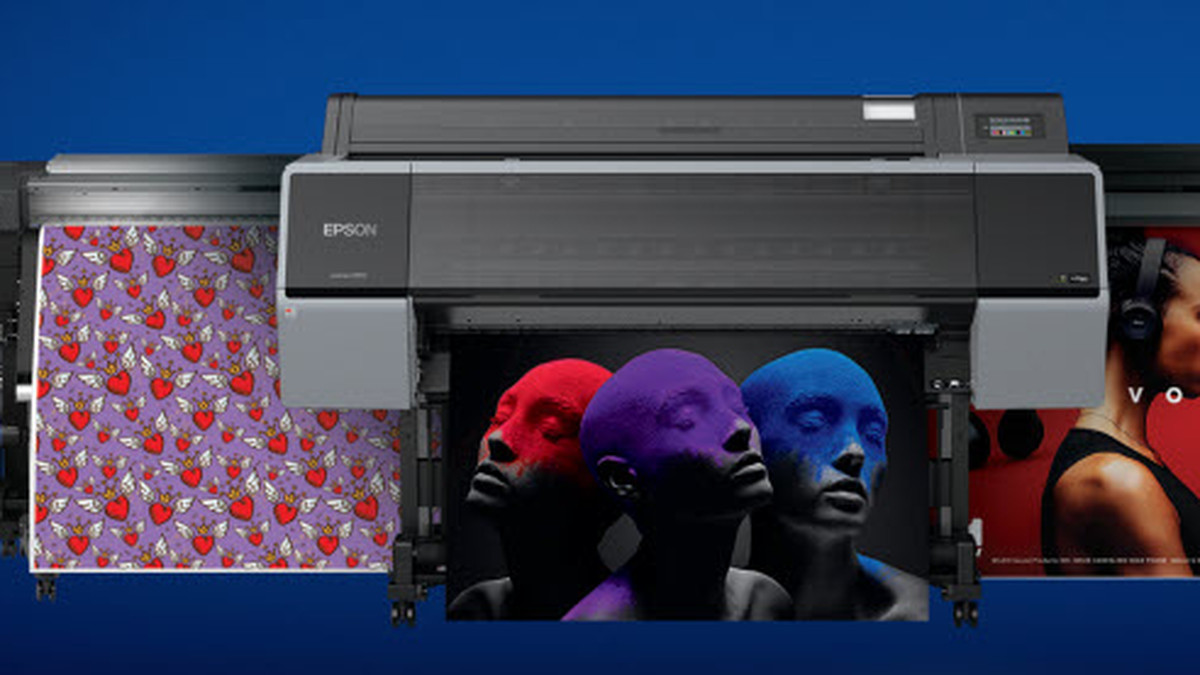The International Sign Expo was all about innovation, growth and opportunities. So is Epson.
“The industry was thrilled to see our new printers,” says Timothy Check, product manager for Professional Imaging at Epson. “Our booth at ISA 2022 was just packed.”
“There was a mood of confidence throughout the show,” explains Matt Mccausland, product manager for Epson wide format printers. “People I met would say, ‘We survived the down times, now let’s grow our businesses.’
“The sign business is going gangbusters,” he adds. “People were excited to see our new offerings, especially the ones able to take them into new areas and new applications.”
Back after three years
This year’s International Sign Expo, held in Atlanta from May 4-6, was the industry’s first in-person tradeshow since 2019.
Canceling the show had been especially painful for the sign industry, because it depends, to a very large degree, on public events. Still, that necessity sparked a great deal of innovation, as business owners scrambled to replace lost revenues.
“The tradeshow market dried up, but people found opportunities in health-safety signs and in customized fabric face coverings,” Check says. “Those shops that had more flexible machines or were able to add them were the ones best able to cope.
“Now that the industry is growing again, people came to the show ready to invest in new technology to help them expand their offerings even more.”
A vision for growth
Mccausland explains that traditionally many sign shops focused on buying and operating solvent-ink machines able to print on the vinyl material traditionally used for most signage. Epson has long embraced this market, with eight 64” models using solvent inks.
Still, “the thing that drew the biggest crowd for Epson at ISA was our new SureColor® V7000, a 4’x 8’, photo-quality UV flatbed that prints directly onto foam core and other rigid substrates. This area of our booth was packed constantly throughout the show.”
Flatbed printers have been around for a while, he explains, but they have had limited capabilities. This machine offers 10-color, photo-quality printing, expanding the types of applications a shop can produce and ultimately making the business more versatile.
“Just imagine all the labor you’d save if you didn’t have to print and mount,” he explains. “Then imagine the possibilities of printing photo quality images directly to the substrate.”
Another huge draw was the SureColor R5070L, Epson’s new 64-inch resin printer, which allows immediate lamination. “It allows you to print on a wide range of materials that a solvent printer can’t, so you can take on more jobs, including wall coverings, uncoated papers, textiles and gift wrap, as well as traditional vinyl media.”
Epson also showed the new SureColor T7770D, which prints posters and point-of-purchase displays on paper rolls or poster board up to 44” wide at speeds over 300 square feet per hour, or simple text and line art at over 1,400 square feet per hour.1
“The goal of these innovations is to produce quality signs and other materials faster, more consistently, using less labor, so that, at the end of the day you can sell more for more profit,” Check adds.
“That’s what made this show so exciting for us, and so exciting for the business owners.”
Complementary markets
Still, innovation in sign printing was only half of the story of ISA. “The pandemic proved that the industry can and must move into new product categories to grow and prosper,” Check says.
For that reason, Epson devoted about half its booth to new direct-to-garment and dye sublimation machines designed to print on cotton, rayon, bamboo, and polyester fabrics.
The SureColor F3070 and SureColor F2100 are direct-to-garment solutions able to print on t-shirts, hats, hoodies, shoes and tote bags.
The SureColor F9470 prints on fabric rolls up to 64” wide, for apparel, soft signage and more, at speeds up to 1,169 square feet per hour.
The SureColor F570 and SureColor F170 have sheet-fed capability for media up to 8” x 11,” and for increased versatility, the SureColor F570 also offers 24-inch wide printing on both roll and sheet media.
Epson also offers dye-sub equipment able to create custom coffee mugs, glassware, and other personalized items, Check explains.
“If you get most of your business from trade shows and other events, and your core skill is printing, then why not print the promotional materials the organizers are going to need?” he asks.
This market-expansion strategy is one that Epson itself has followed. The company spent years developing its PrecisionCore® print head, which is an electro-mechanical device that uses piezo actuators only one 1/1000 of a millimeter thick. It can deposit variable-sized ink drops on wide variety of materials at up to 40 million dots per second. “Once we introduced it, we started using PrecisionCore to change the quality expectation in a variety of markets, from sign printing to office copiers to printing on fabrics and garments,” Mccausland says. “It’s like watching a 4K TV when you’re used to standard definition.”
“Many business owners love the idea of becoming a one-stop shop for trade shows and events,” Check adds. “It’s another way of providing a higher value service and earning more profits.”
“We saw a lot of excitement and enthusiasm at ISA because people know the industry is growing and because Epson is introducing the technology they need to grow rapidly.
“Most business owners feel they can make investments now because they know the market will continue to get stronger.”
___________
1Actual print times will vary. Print speeds are based on the print engine speed only. Total throughput time for any print depends on various factors including workstation configuration, file size, print resolution, ink coverage and networking.
